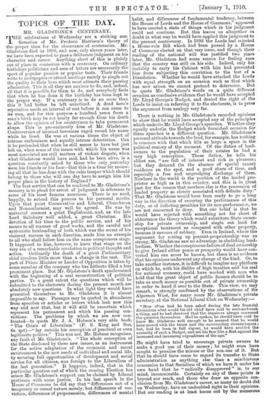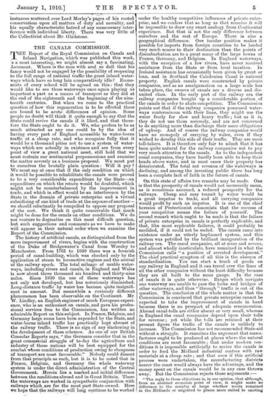TOPICS. OF THE DAY.
MR. GLADSTONE'S CENTENARY. r,E celebrations of Wednesday are a striking con- firmation of Mr. Frederic Harrison's theory of the proper time for the observance of centenaries. Mr. Gladstone died in 1898, and now, only eleven years later, we have been expected to pass a deliberate judgment on his character and career. Anything short of this is plainly out of place in connexion with a centenary. On ordinary birthdays politicians and men of letters are necessarily the sport of popular passion or popular taste. Their friends write to newspapers or attend meetings merely to single out the quality in their hero which most attracts their passing admiration. This is all they are anxious to do, and, indeed, all that it is possible for them to do, and everybody feels that when he has done it the birthday has been kept in the proper way. If a centenary is to do no more than this it had better be left unnoticed. A dead hero's reputation needs an interval of rest before it can come to its own, and for this purpose a hundred years from a man's birth may be not nearly far enough from his death to allow the opinion of his countrymen to take permanent shape. This is pre-eminently true of Mr. Gladstone. Controversies of unusual fierceness raged round his name while he lived. He was at various times the object of intense enthusiasm and equally intense detestation. Can it be pretended that when he still seems to have but just left us, when some of the issues with which his name was most associated are still matters of violent dispute, when what Gladstone would have said, had he been alive, is a question constantly asked by those who only yesterday were his friends or his foes—that this is a time for review- ing all that he has done with the calm temper which should belong to those who will one day have to assign him his proper place in the history of England ?
The best service that can be rendered to Mr. Gladstone's memory is to plead for arrest of judgment in reference to some of his most famous measures. There is no need, happily, to extend this process to his personal merits. Upon that point Conservative and Liberal, Churchman and Nonconformist, may well be agreed. He was by universal consent a great Englishman, and, as the late Lord Salisbury well added, a great Christian. His devotion of his time to the public service, and of his means to all manner of good works, and the careful and systematic husbanding of both which was the secret of his eminent success in each direction, made him an example to all who shall follow him on the same conspicuous stage. It happened to him, however, to leave that stage on the very eve of a remarkable revolution in political thought and action. Ordinarily the death of a great Parliamentary chief involves little more than a change in the cast. The part of Prime Minister or Leader of Opposition is taken by some member of the company who has hitherto filled a less prominent place. But Mr. Gladstone's death synchronised with the beginning of a real reconstruction of political parties. To a great extent the questions which will be submitted to the electorate during the present month are absolutely new questions. In what light they would have presented themselves to Mr. Gladstone it is almost impossible to say. Passages may be quoted in abundance from speeches or articles or letters which look now this way and now that, but it will still be uncertain which represent his permanent and which his passing con- victions. The problems by which we are now con- fronted—to quote Mr. J. A. Hobson's very able book, " The Crisis of Liberalism" (P. S. King and Son, 6s. net)—" lay outside his conception of practical or even legitimate politics." This was not, Mr. Hobson recognises, any fault of Mr. Gladstone's. " The whole conception of the State disclosed by these new issues, as an instrument for the active adaptation of the economic and moral environment to the new needs of individual and social life, by securing full opportunities of development and social service for all citizens, was foreign to the Liberalism of the last generation." It happens, indeed, that in the particular question out of which the coming Election has arisen Mr. Gladstone's support can be claimed by Liberal partisans with some justice. In his last speech in the House of Commons he did say that " differences not of a temporary or casual nature merely, but differences of con- viction, differences of prepossession, differences of mental habit, and differences of fundamental tendency, between the House of Lords and the House of Commons," appeared to have created a state of things which in his judgment could not continue. But this leaves us altogether in doubt in what way he would have applied this judgment to the present controversy. In 1893 the Lords had rejected a, Home-rule Bill which had been passed by a House of Commons elected on that very issue, and though their . reading of the national will was justified two years later, Mr. Gladstone had some reason for feeling sure that the country was still on his side. Indeed, only his inability to carry his Cabinet with him had prevented him from subjecting this conviction to the test of a Dissolution. Whether he would have attacked the Lords with equal strength on an occasion such as that which has now arisen we cannot pretend to determine. But to quote Mr. Gladstone's words on a quite different occasion as conclusive evidence that he would have accepted Mr. Lloyd George's Budget, and denied the right of the Lords to insist on referring it to the electorate, is to press the argument from analogy very far.
There is nothing in Mr. Gladstone's recorded opinions to show that he would have accepted any of the principles which underlie Mr. Lloyd George's speeches. Whether they equally underlie the Budget which furnished occasion for these speeches is a different question. Mr. Gladstone's personal attitude towards the land, for example, has nothing in common with that which fills so large a space in the political oratory of the moment. Of the duties of land- owners to the population of their estates he had a very high conception. Those duties, he tells his eldest son, " are full of interest and rich in pleasure ; but they demand (in the absence of special cause) residence on the spot, and a good share of time, and especially a free and ungrudging discharge of them. Nowhere in the world is the position of the landed pro- prietor so high as in this country, and this is in great part for the reason that nowhere else is the possession of landed property so closely associated with definite duty." That Mr. Gladstone would have been ready to go a long way in the direction of ensuring the performance of this duty, or of inflicting penalties for its non-performance, we are not concerned to deny. But our belief is that he would have rejected with something not far short of abhorrence the theory which would substitute State owner- ship for private ownership, and single out land for exceptional treatment as compared with other property, because it savours of robbery. Even in Ireland, where the argument for setting up peasant-proprietorship was so strong, Mr. Gladstone saw no advantage in abolishing land- lordism. Whether the conspicuous failure of dual ownership to give Ireland either peace or prosperity would have con- verted him can never be known, but there is no evidence that his opinions underwent any change of _the kind. Or, to take another instance, it is difficult to imagine any platform on which he, with his dislike of high taxation and his zeal for national economy, could have worked with men who hold that the great object of public finance should be to take as much money as possible out of private ownership in order to hand it over to the State. This view, we may remark, is strongly confirmed by the observations of Sir Algernon West, for many years Mr. Gladstone's private secretary, at the National Liberal Club on Wednesday :— "How often had he been asked during the late financial discussions what would his old chief have said to such-and-such a thing, and he had observed that the inquirers always answered the question themselves. Had he spoken, he should have said he knew Mr. Gladstone well enough to be assured that he would have moved with the times and the surrounding circumstances ; but, had he been in full vigour, he would have avoided the necessity of such a Budget, and set his face like a flint against the increased and increasing expenditure of the age."
He might have tried to encourage private owners to make a good use of their money ; he might even have sought to penalise the misuse or the non-use of it. But that he should have come to regard its transfer to State administration as anything else than a mischievous concession to that Socialism of which we have it under his own hand that he " radically disapproved " is, to our mind, inconceivable. Certainty on any of these points is beyond our reach, and those who draw an opposite con- clusion from Mr. Gladstone's career, as many no doubt did on Wednesday, have an undoubted right to their opinions. But our reading is at least borne out by the numerous instances-scattered over Lord Morley's-pages of his rooted conservatism• upon all matters of duty and morality, and his equally- characteriatic hatred of any unnecessary inter- ference with, individual liberty. There was very little of the Collectivist about Mr. Gladstone.















































 Previous page
Previous page